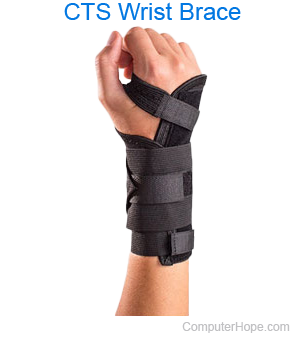What are the disadvantages of using a computer?
Although there are many advantages to using a computer, there are also dangers and disadvantages (like most things in life). Computers pose several potential health concerns if not used properly. Below are the negative impacts of using digital technology and computers and the problems you may experience.
Carpal tunnel and eye strain

A computer requires a lot of repetitive movement, which often leads to carpal tunnel syndrome. For example, moving your hand from your keyboard to a mouse and typing are all repetitive and inflict injuries.
In addition to repetitive movements, staring at a bright screen for hours can cause eye strain and CVS (Computer Vision Syndrome).
Taking breaks, maintaining proper posture, and understanding computer ergonomics help prevent or delay these injuries.
Too much sitting
Too much of anything is bad, and too much sitting for a long time and becoming a mouse potato can lead to health problems. Also, substituting a traditional desk for a standing desk is not a perfect solution. Studies show that standing for a long time is not healthy but is better than sitting. The best solution is to take frequent breaks to move around, stretch, and exercise.
Short attention span and too much multitasking
With today's computers, devices, and the Internet, humans have become hooked on instant gratification. As you use a computer and the Internet and get immediate answers to your questions and requests, you become accustomed to getting that quick dopamine fix. You can become easily frustrated when something doesn't work or is not answered promptly.
With a reduced attention span, it is also not uncommon to multitask more and work on more than one thing at the same time. Many studies show that multitasking is less productive, can cause more mistakes, and may even be bad for your brain.
Limits learning and creates a dependency
If you can remain focused, a computer with the Internet can be one of the greatest tools in history to learn about anything. It's also easy to become overly reliant on a computer and other electronic devices. For example, a spell checker is a great tool for finding spelling errors. However, if you never learn the proper spelling of a word and rely on a spell checker or autocorrect, you're more likely to make spelling errors.
Other tools like grammar checkers, GPS (Global Positioning System), and calculators are also extremely helpful. However, if you become too reliant on these tools, you may be helpless when they're unavailable.
Potential of loss of privacy

With computers storing so much personal information, it's at risk of getting into the hands of others. Once a malicious person has your information, they could access your online accounts or use identity theft to open other accounts, such as a new credit card under your name.
Time sink and distractions
Although a computer can increase your productivity, it can also waste a lot of your time. For example, you could be trying to learn more about computers and see an interesting link on cooking spaghetti, spending a few minutes reading that page. Then, you read a page about the best pot to use, which leads to reading about healthy eating. Two hours later, you realize you never achieved your original goal.
Also, with the popularity of social networks and notifications, you can become easily distracted while trying to work.
Increases waste and impacts the environment

With the speed at which computers and other electronics are replaced, older devices are thrown away frequently. If disposed of improperly, these disposed of electronics (e-waste) can significantly impact the environment and be a hazard to humans and other life.
Can reduce jobs
As computers become smarter and more capable, they also replace the need for many jobs. In the future, it's not inconceivable that computers can carry out any job.
Trolls, abuse, stalking, and exploitation

Anyone who has spent time on the Internet has encountered trolls or abusive people who intentionally inflict pain and suffering on others. Unfortunately, with the anonymous nature of the Internet, it's easier to encounter these people.
With more people sharing information on the Internet, it's also easier for stalkers to find personal information about people and their families. They can also use online services to find information about people. Once this information is discovered, they may even dox a person.
Finally, the Internet also makes it easier for those who prey on others to find people to exploit.
You could become anti-social or depressed
With all the possibilities available on a computer, it is easy to get obsessed to the point you become anti-social. For example, many online games (e.g., World of Warcraft) are designed to be addictive, causing you to play the game more than being around others. Others may find online shopping so beneficial that they rarely go out to shop.
See our computer addiction page for further information about and help with computer addiction.
Social networks (e.g., Facebook) can also be an escape from the real world by enabling virtual socializing with friends and family. However, many studies show that social network sites can be depressing because they only show all the good, fun, and interesting things friends and family are doing. Viewing this type of content can make people believe that other people's lives and experiences are better than theirs. In reality, most people only share good events and not bad events.
